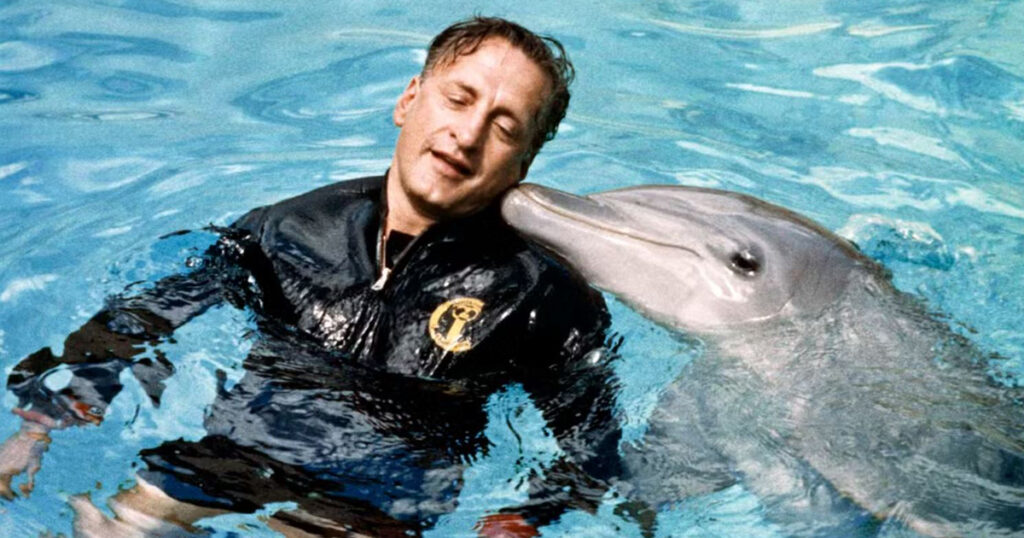[9]
George C. Scott (Patton, The Changeling) stars as a marine biologist teaching a dolphin named Alpha to speak in this unusual film from director Mike Nichols (The Graduate, Who’s Afraid of Virginia Woolf?) and screenwriter Buck Henry (adapting loosely from a novel by Robert Merle). Scott and his team’s love for the dolphin and concern for his well-being are put to the test when a secretive group of shady characters kidnap the mammal and his girlfriend, Beta, and train them to attach bombs to the bottoms of ships.
Day of the Dolphin may sound like a curious combination of a family film mixed with a thriller, but Buck Henry writes with the intention of subverting our expectations for both genres. It’s not a saccharine film, nor does in wallow in sentimentality. The suspense built throughout the film is not from the conventional military/kidnapping plot. In fact, Henry goes out of his way to avoid standard foreshadowing. The suspense comes instead from the looming threat to Scott’s relationship to Alpha and Beta and their well-being as research captives. Day of the Dolphin is a genre-defying drama about communication between two species: a love story between humans and dolphins.
The film opens with a beautiful closeup of Alpha’s face and Georges Delerue’s hauntingly elegiac music. From that moment forward this film had me in the palm of its hand, praying that no harm would befall this wonderful creature. We immediately learn that Alpha has bitten one of his handlers, but no one’s upset with him. They all know he’s a maturing mammal who will soon need more connection with his own kind. So they introduce him to Beta and the two dolphins bond in short time. A new problem arises, though: Distracted by Beta, Alpha stops speaking. Scott’s character puts a wall between the dolphins in an attempt to get Alpha to communicate again. In a heartbreaking sequence, the dolphins go out of their minds trying to get back to each other. Scott sleeps by their pools, waiting for as long as it takes for Alpha to end his ‘strike’. Scott’s clearly hurting inside, wrestling with his duty as a scientist and his compassion for these animals. We the audience realize that for a truly happy ending, not only do Alpha and Beta need protected from the film’s shady villains, but they also need freed from their caretakers as well.
While in their tanks, the dolphin characters are objects of study, but in the ocean waters they become the subjects of the film — heroes with agency. These animals carry out the dramatic climax of their own movie without much human intervention. It’s up to George C. Scott’s character, however, to give them lasting peace. The naïve innocence of the dolphin characters contrasts with the murky complexity of humans throughout the climax and finale. When Scott urges the dolphins to flee into the wild, they won’t leave his side. The truth isn’t enough to convince them, so he’s forced to lie — to tell them he doesn’t really love them.
I love any movie that can devastate me emotionally and make me think about the human condition, to say little of its considerable aesthetic appeal. Mike Nichols and Buck Henry both shunned Day of the Dolphin after if failed at the box office. But I champion it, and I know many others have begun to reassess it in recent years. It’s a mistake to think of it as a failed genre piece (of any kind). It’s something more unique, thoughtful and moving. I adored every second.
Side Note: The two star dolphins of this film, ‘Buck’ and ‘Ginger’, reportedly escaped captivity after their scenes were completed and were never seen again.
With Trish Van Devere, Paul Sorvino, Edward Herrmann, and John David Carson.
Oscar Nominations: Best Sound, Best Score (Georges Delerue)

